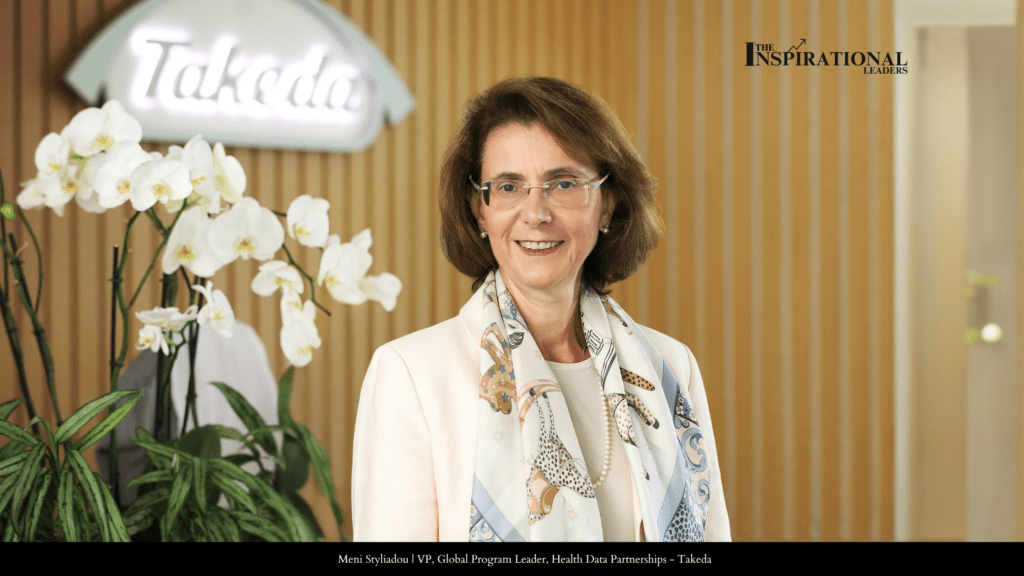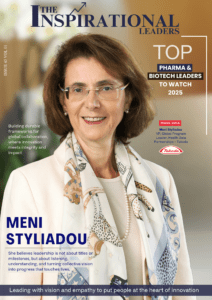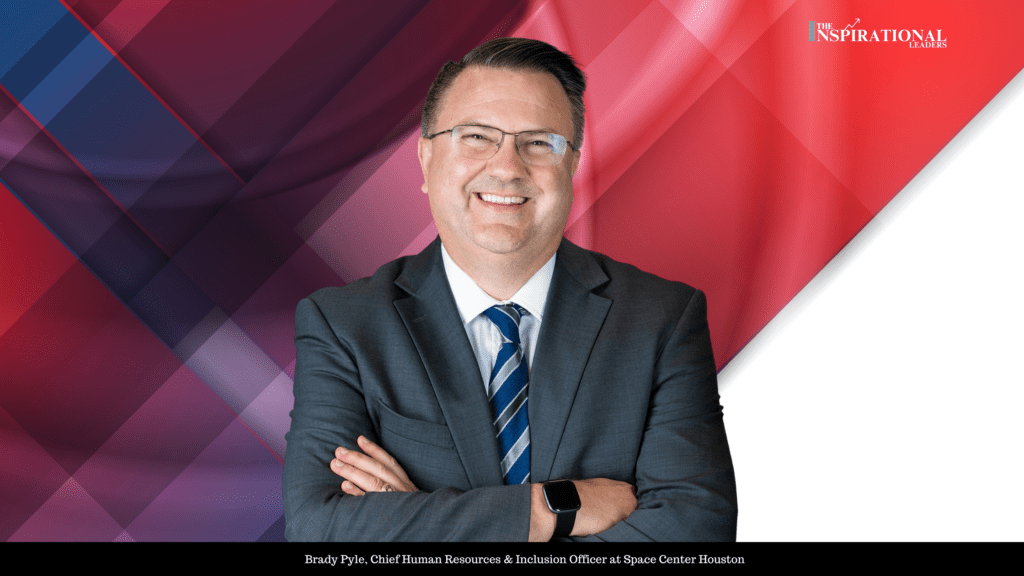In an era where artificial intelligence, real-world data, and digital health tools are rewriting the rules of medicine, few leaders stand as clearly at the intersection of technology, healthcare, and societal impact as Meni Styliadou, Vice President and Global Program Leader for Health Data Partnerships at Takeda.
Her career journey reflects an enduring theme: creating impact that transcends industries and touches lives. From her early work enabling broadband infrastructure across Europe to her present mission of building trusted frameworks for health data collaboration, Meni’s path is defined by curiosity, conviction, and the belief that innovation in healthcare must begin and end with people.
As part of our special feature “Top Pharma & Biotech Leaders to Watch in 2025,” we had the opportunity to explore her vision, her leadership philosophy, and the initiatives she is driving that may well shape the future of life sciences.
From Technology to Healthcare: A Journey Driven by Societal Impact
When asked what first drew her into the world of healthcare and data, Meni recalls that the seeds were planted much earlier in her career. “There’s a common theme throughout my career: creating societal impact,” she reflects.
In the first half of her professional life, she worked in technology, focused on enabling broadband to scale across Europe. The mission was ambitious—removing policy barriers and building the infrastructure that would connect people at scale. While the results were transformative for many sectors, Meni noticed something that unsettled her.
“The sector that could benefit most from this leap forward—healthcare—was not making use of it. That question stayed with me: why isn’t health fully benefiting from technology?”
When the opportunity arose to transition into healthcare, Meni embraced it. That curiosity evolved into a guiding motivation. Today, she sees the same fundamental challenge: digital tools, whether AI or others, are only as effective as the data they are trained on. And the healthcare sector still struggles with how it generates, governs, and applies data.
Her current role at Takeda is dedicated to addressing that gap head-on.
Building Health Data Partnerships at Takeda
Takeda’s deep-rooted focus on innovation and putting patients first resonates strongly with Meni’s personal vision. Her mission is built on a clear but transformative principle: large-scale healthcare innovation is only possible when supported by trusted data collaborations.
“At Takeda, we believe that true innovation in health requires the ability to analyse data at scale,” she explains. “That is only possible when stakeholders are willing to share data in trusted frameworks, with the right governance and access models in place.”
Her mandate is to build those partnerships—creating the governance, trust, and collaboration required to unlock the full potential of health data. This is not merely conceptual. Meni points to one initiative that embodies this work: the Health Outcomes Observatory (H2O).
Launched initially as an Innovative Health Initiative-funded public-private partnership, H2O has since matured into a pan-European independent body. Its mission is clear: empower patients to systematically capture and share their health outcomes in standardized, transparent ways. By doing so, it enhances the dialogue between patients and their clinicians while also enabling regulators, researchers, and industry to use this data responsibly for advancing care.
“Efforts like this are fully aligned with Takeda’s vision,” she says. “To put patients at the center, advance science responsibly, and drive innovation that is meaningful in the real world.”
Unlocking the Power of Real-World Data
Traditional clinical trials have long been the gold standard for evaluating treatments. Yet Meni emphasizes that they operate under controlled conditions that rarely reflect the complexity of real life.
“If we want to achieve actual breakthroughs in healthcare, the type of data that we can capture in the real world is much richer than what we capture in clinical trials,” she explains. “In everyday life, patients have multiple conditions, take other medicines, and live in varied environments. Real-world data fills that gap. It helps us understand how treatments truly work in practice, identify trends, and even uncover unexpected links between conditions.”
However, a challenge remains. Regulators and health technology assessment bodies have often been cautious about real-world evidence—not because methodologies lack rigor, but because reliable data has not been available at scale. That is precisely what Meni’s team is working to change.
“We are building the structures, governance, and incentives needed for stakeholders to generate standardized, high-quality patient outcomes data. Only then can real-world evidence give voice to patients and drive our decision-making.”
Navigating the Challenges of Data Partnerships
While the benefits of health data partnerships are evident, forging them is not without obstacles. Meni is candid about the complexity.
“True collaboration only succeeds when it creates shared gains for all stakeholders. You can’t convince stakeholders to collaborate unless it’s clear that by coming together, we will create something bigger than any one of us could achieve alone.”
She highlights that effective partnerships rely on robust governance, clear transparency, and inclusive decision-making with all parties involved. She acknowledges that managing partnerships is often more complex than leading a single organization. Yet she likens the approach to Switzerland’s enduring consensus-based system: complex but remarkably durable.
“She highlights that it remains the most effective route to drive enduring change and real value.
Embedding Ethics and Governance from the Start
Ensuring ethical, private, and well-governed use of data is now a top priority in the digital age. For Meni, these are not add-ons but the foundation of any project.
“From the very beginning of my career, I’ve put societal expectations, ethics, and governance at the core of my thinking. I don’t think of governance as something to ‘fix’ afterwards, but as the foundation on which a project is built.”
This philosophy extends beyond compliance with existing standards. Takeda and its partners actively engage in shaping emerging frameworks to ensure data can be shared responsibly, with patient privacy and control protected.
“By embedding these principles upfront, we can be pioneers in shaping how global standards evolve,” she says.
Fostering Trust Across Diverse Ecosystems
Takeda’s partnerships bring together regulators, academic institutions, technology innovators, and other pharmaceutical players. Navigating such a diverse ecosystem requires both vision and transparency.
“Whether you’re partnering with another company, a regulator, or an academic institution, the formula is the same: shared purpose and win-win. Trust cannot rely on goodwill alone—it must be grounded in transparency,” Meni emphasizes.
For her, successful collaboration means being direct about objectives and eliminating hidden agendas. By acknowledging that industry aims to create shareholder value while simultaneously recognizing the need for patient access and regulatory trust, honest dialogue becomes possible.
“It’s about putting everything openly on the table and creating the space for sustainable collaboration,” she affirms.
H2O: A Case Study in Patient Empowerment
Among the many initiatives Meni has championed, the Health Outcomes Observatory remains especially close to her heart. It embodies the patient-centric, multi-stakeholder approach she believes is essential for the future of healthcare.
“The idea was born out of a simple yet ambitious question: how can we enable patients across Europe to consistently report their health outcomes in a way that truly improves their conversations with their medical team, while also enabling researchers and decision-making bodies to seize that powerful data?”
The initiative’s growth has been remarkable. From its beginnings as a collaborative project, H2O has now established a pan-European independent Observatory with robust governance. Patients, clinicians, regulators, academia, and industry each have an equal voice.
“This is what turns a bold idea into a durable institution,” Meni notes. “H2O is a concrete example of how patient empowerment, combined with rigorous governance, can be an actual game changer for how healthcare systems allocate resources and improve outcomes.”
The Future of Health Data in Pharma and Biotech
Looking to the future, Meni makes it clear that health data will serve as the foundation for the next wave of innovation.
“Health data is the ‘must have’ for creating innovation in life science. AI may be the trend everyone talks about, yet it can only perform as well as the data used to develop it. If we want real breakthroughs—curing diseases, identifying root causes, predicting progression—we need big, meaningful, connected data.”
She envisions a system where incentives and trust enable stakeholders to share and link data responsibly. The metaphor she uses is powerful:
“Think of health data as a puzzle: holding one piece is useful, but the real ‘aha’ moments only come when you see the full picture. That’s the future I see.”
Leadership with Vision and Empathy
Leadership in such a dynamic, complex field requires both decisiveness and humility. Meni describes her philosophy as combining vision with creating a safe space for her teams.
“The leader’s job is not just to set a strategy and ask others to execute—it’s to paint a picture compelling enough that people want to join, improve it, and make it bigger than what you started with.”
She views herself as a source of clarity and energy—a “cheerleader” who empowers teams to bring their best while remaining accountable to meaningful results.
Advice for the Next Generation
When asked what advice she would share with emerging professionals, particularly women aspiring to careers at the intersection of healthcare and data, Meni’s response is direct and empowering.
“Instead of waiting to be asked, claim your spot at the table. The intersection of healthcare and data needs diverse thinkers, bold questions, and empathetic leaders. Stay curious, stay grounded in your values, and seek out mentors who will challenge and support you. And most importantly: remember that every dataset represents a real person. Never lose sight of the people at the heart of the data.”
Why Meni Styliadou Is a Leader to Watch in 2025
In a pharmaceutical and biotech landscape increasingly defined by digital transformation, leaders like Meni Styliadou are crucial. She embodies the rare combination of technical foresight, patient-centric commitment, and collaborative leadership that the sector needs to navigate the challenges ahead.
Her work at Takeda—particularly in building scalable health data partnerships and pioneering initiatives like the Health Outcomes Observatory—demonstrates how innovation can be pursued responsibly and inclusively.
As the healthcare ecosystem moves towards an era where connected health data underpins breakthroughs in treatment, prevention, and policy, Meni’s voice and vision will be essential. She reminds us that while technology and data are powerful, their true value lies in how they empower patients, improve outcomes, and create lasting societal benefit.




